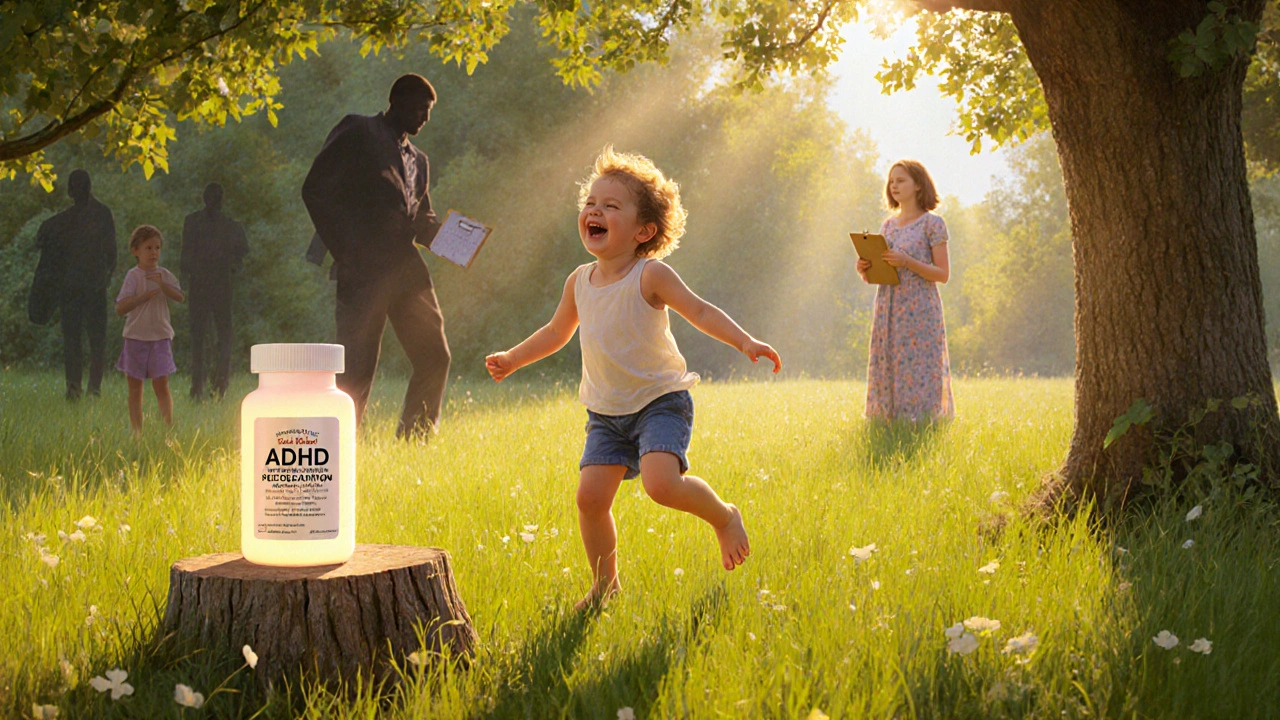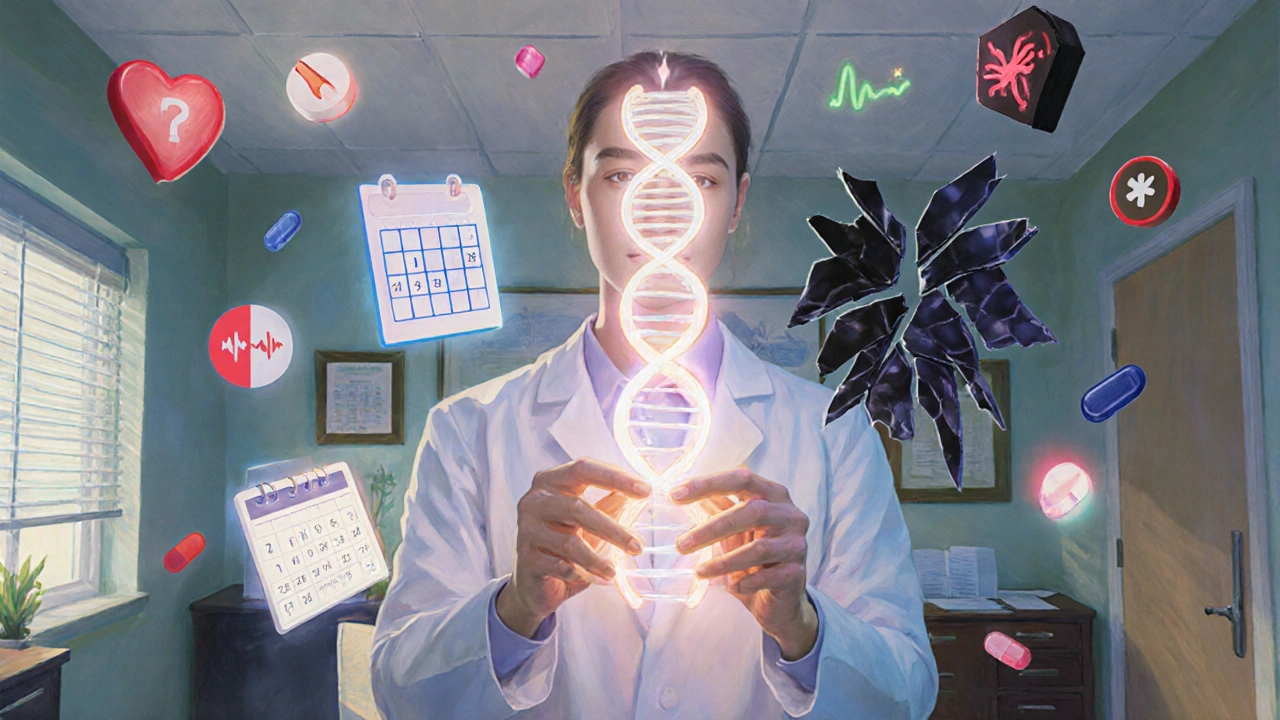Drug Holiday Safety Checker
Check if your medication is safe for a drug holiday
Drug holidays can be beneficial for some medications, but not all. This tool helps you understand if your specific medication might be suitable for a supervised break. Always consult your doctor before making any changes to your medication regimen.
Drug Holiday Assessment
Your results will appear here after checking your medication
Stopping your meds for a few days sounds like a good idea-especially when the side effects are dragging you down. Maybe your sex life has vanished since starting antidepressants. Or your kid’s appetite has tanked on ADHD meds. You think: drug holidays could help. And sometimes, they do. But not all meds are created equal. Jumping off your prescription without a plan can be dangerous-even deadly. This isn’t about skipping pills because you forgot. It’s about a controlled, medical-grade pause. And it only works when done right.
What Exactly Is a Drug Holiday?
A drug holiday is a planned, short-term break from medication, guided by your doctor. It’s not quitting cold turkey. It’s not waiting until you feel "ready." It’s a structured pause with clear start and end dates, monitoring steps, and a return plan. The goal? To reduce side effects, reset your body’s response to the drug, or check if you still even need it. This idea got big in the 90s with HIV meds. Doctors thought giving the immune system a break might help. Then came the SMART trial in 2006-over 5,000 people studied across 33 countries. The result? Those on drug holidays had more infections, heart problems, and even died sooner. HIV drug holidays? Now considered unsafe. But here’s the twist: for other conditions, drug holidays still have a place. Especially in psychiatry and neurology. The key isn’t the concept-it’s the drug, the condition, and the plan.When Drug Holidays Actually Help
Not all meds need to be taken every single day. Some can be paused safely if you know how. Antidepressants, especially SSRIs like fluoxetine (Prozac): One of the most common reasons people ask about drug holidays is sexual side effects. Low libido, trouble reaching orgasm-these are real, and they hurt relationships. Weekend breaks (48-72 hours) have been studied for this. Because fluoxetine sticks around in your system for 4-6 days, stopping Friday night and starting again Monday works. Studies show about 65% of people see improvement in sexual function without a dip in mood. One patient on PatientsLikeMe said, “Two days off Prozac restored intimacy without noticeable mood changes.” That’s the sweet spot. ADHD stimulants like methylphenidate or amphetamine (Ritalin, Adderall): These are trickier. Parents often want breaks during summer or holidays to help kids eat better or grow taller. The Child Mind Institute found that 78% of kids have a rebound effect-more impulsivity, mood swings, even meltdowns. One mom shared how her 10-year-old ended up in the ER three times over summer because of reckless behavior. But for about 15-20% of kids, the growth benefit is real enough to justify a break. The catch? You need to track behavior closely. If they’re failing camp, losing friends, or getting in fights, the break isn’t helping. Other meds? Not so much. Beta-blockers, seizure drugs, corticosteroids-these can cause life-threatening withdrawal. Stop them suddenly, and you risk heart attack, seizures, or adrenal crisis. No exceptions.Why Some Drugs Can’t Take a Break
It’s all about pharmacokinetics-how your body handles the drug. Half-life matters. So do active metabolites. Take paroxetine (Paxil). Half-life? 21 hours. That means the drug leaves your system fast. Stop it for a day, and you might get brain zaps, dizziness, nausea. These aren’t "just side effects"-they’re withdrawal. A 2023 Drugs.com survey found 41% of users experienced these symptoms during unplanned breaks. Venlafaxine (Effexor)? Half-life of 5 hours. Not a candidate for any kind of holiday. Fluoxetine? Half-life of 4-6 days. That’s why weekend breaks work. Your brain still gets enough of it to stay stable. Parkinson’s meds used to be paused in 4-8 week "holidays" to reset dopamine receptors. Then doctors realized patients were crashing-worse tremors, more falls, 22% higher hospitalization rates. That practice is gone. HIV? As we saw, deadly. Even a short break can let the virus rebound and become resistant. Bottom line: If your drug has a short half-life or controls something critical-like your heart rhythm, brain seizures, or immune system-don’t even think about stopping it without your doctor’s full plan.
The Real Risks: What No One Tells You
The biggest danger isn’t the drug itself. It’s the lack of structure. Most people who try drug holidays do it on their own. That’s where things go wrong. The NCBI reviewed 347 cases of unsupervised medication breaks. The success rate? Only 22%. When doctors guided the process? 68% success. Here’s what goes wrong:- Withdrawal symptoms: Brain zaps, insomnia, anxiety, nausea-these aren’t "just stress." They’re your nervous system reacting to the sudden drop.
- Rebound effects: ADHD symptoms come back harder. Depression can slam back in 14 days. One study showed 33% of people with past depressive episodes relapsed within two weeks of stopping SSRIs.
- Family pressure: "Just skip it for the weekend!" That’s how a 3-day break becomes a 2-week one. And then you’re stuck.
- Missing the warning signs: If your kid’s teacher says they’re "acting out more," or your partner says you’re "not yourself," those are red flags. But most families don’t know what to look for.
How to Do a Drug Holiday Right
If you and your doctor agree it’s worth trying, here’s how to do it safely:- Wait at least 6 months after your meds have stabilized. No holidays for new prescriptions.
- Track your symptoms for 4-8 weeks before starting. Use a journal or app. Note mood, sleep, side effects, energy.
- Choose the right drug. Only use this with long-half-life meds like fluoxetine. Avoid short-acting ones.
- Set clear dates. "I’ll stop Friday night and restart Monday morning." No "maybe." No "if I feel okay."
- Have a return plan. If you feel worse, go back on the meds immediately. Don’t wait.
- Teach your family. If it’s a child, the school, coach, or babysitter needs to know the plan. What’s normal? What’s not?
- Check in with your doctor. A 72-hour follow-up after the break is standard for high-risk meds.

What the Experts Say
Dr. Michael Craig Miller from Harvard says drug holidays can help the body recover from "suppressed systems"-like when meds dull your natural responses. He supports them for SSRIs with sexual side effects. But Dr. Alan Ravitz from the Child Mind Institute is blunt: "For most kids with ADHD, the social cost of a summer break outweighs any benefit." His data shows kids on year-round meds have 37% better social skills and 29% fewer behavioral incidents. Dr. David Healy warns that antidepressant holidays carry a high relapse risk, especially if you’ve had multiple episodes of depression. His 2020 meta-analysis found 33% of patients relapsed within two weeks. The American Academy of Child and Adolescent Psychiatry doesn’t ban summer breaks-but they insist on monitoring. And they note a 45% spike in accidents during medication-free periods.What’s Changing in 2025
The field is moving fast. In 2023, the FDA approved a new extended-release bupropion formulation designed with built-in "holiday windows"-a way to reduce SSRI side effects without full breaks. That’s a game-changer. The NIH’s SPRINT trial is now testing personalized drug holidays using genetic testing. Your DNA might tell you if you’re at risk for withdrawal or rebound. Most electronic health records (Epic, Cerner) now have built-in holiday tracking modules. Doctors can set alerts for when a patient’s meds were paused, how long, and whether they returned on time. Telehealth companies like Cerebral and Done are seeing 40% year-over-year growth in consultations for structured medication breaks. That tells you something: people want this-but they need help doing it right.Final Advice: Don’t Guess. Plan.
A drug holiday isn’t a vacation. It’s a medical procedure. And like any procedure, it has risks. But it also has rewards-if you’re smart about it. If you’re struggling with side effects, talk to your doctor. Don’t Google it. Don’t ask Reddit. Bring your symptom journal. Ask: "Is my drug a candidate for a break? What’s the plan? What happens if I feel worse?" For most people, the answer will be no. But for some-those with long-acting SSRIs, stable depression, and clear side effects-it can be life-changing. The goal isn’t to stop meds forever. It’s to live better while taking them. And sometimes, that means taking a short, smart break.Can I take a drug holiday for my antidepressants to fix sexual side effects?
Yes, but only under medical supervision and only with certain medications. Fluoxetine (Prozac) is the most suitable because of its long half-life (4-6 days). A weekend break-stopping Friday night and restarting Monday-is often safe and effective for 65% of users. Shorter-acting SSRIs like paroxetine or venlafaxine carry high withdrawal risks and should not be paused without a taper plan. Always track your mood and have a clear return plan.
Are drug holidays safe for ADHD meds like Adderall?
Generally, no. While some parents take a break during summer to help with appetite or growth, 78% of children experience a rebound in symptoms-impulsivity, mood swings, social struggles. Studies show 45% more accidents and 37% worse social functioning during medication-free periods. If a break is considered, it must be short, monitored, and paired with a strict return protocol. Most experts recommend year-round treatment for stability.
What happens if I stop my medication cold turkey?
Stopping abruptly can be dangerous-or deadly. Beta-blockers can trigger heart attacks. Seizure meds can cause status epilepticus. Corticosteroids can cause adrenal crisis. Even antidepressants can cause brain zaps, dizziness, and severe anxiety. Withdrawal symptoms are not "in your head." They’re physical reactions to sudden chemical changes. Never stop a prescription without your doctor’s guidance.
How do I know if my drug is a good candidate for a holiday?
Look at the half-life. Drugs with long half-lives (over 24 hours) like fluoxetine, escitalopram, or extended-release formulations are better candidates. Short-acting drugs like paroxetine, venlafaxine, or immediate-release stimulants are risky. Also, avoid holidays for drugs that control life-critical functions: heart rhythm, seizures, or immune response. Always check with your prescriber and review your medication’s FDA label for discontinuation warnings.
How long should a drug holiday last?
It depends on the drug and reason. For SSRI sexual side effects: 48-72 hours. For ADHD summer breaks: up to 8-12 weeks, but only if closely monitored. For antidepressants checking if you still need them: 3-7 days. Never extend a holiday without consulting your doctor. Longer breaks increase relapse and withdrawal risks significantly.
Can I use telehealth to plan a drug holiday?
Yes-many telehealth platforms now specialize in medication management, including structured holidays. Companies like Cerebral and Done have seen 40% growth in these services since 2021. They offer symptom tracking tools, doctor consultations, and emergency protocols. But make sure the provider is licensed, follows clinical guidelines, and doesn’t push holidays for profit. Always verify they’re using FDA-approved protocols.

Kelsey Robertson
November 18, 2025 AT 19:51Let me just say this: if you’re taking a "drug holiday" because you’re tired of feeling like a zombie, you’re not weak-you’re human. But here’s the kicker: your brain doesn’t reset like a phone. It rewires. And when you think you’re "testing" your meds, you’re actually playing Russian roulette with your neurochemistry. Fluoxetine? Sure, maybe. But what about the 30% who get suicidal ideation on day 3 of a break? No one talks about that. You want a holiday? Go to Bali. Not off your SSRIs.
Joseph Townsend
November 20, 2025 AT 00:25Ohhhhh, so now we’re romanticizing pharmaceutical rebellion like it’s some kind of punk rock anthem? "I took a weekend off Prozac and my libido came back like a symphony!" 🎻💥 Meanwhile, your kid’s throwing chairs at soccer practice because you "let them chill" off Adderall. This isn’t empowerment-it’s negligence dressed up as self-care. I’ve seen the ER reports. I’ve read the coroner’s notes. A drug holiday isn’t a vibe. It’s a liability with a prescription label.
Bill Machi
November 21, 2025 AT 15:21As an American who served in the military, I find this entire concept dangerously un-American. We don’t take breaks from discipline. We don’t quit our duty because it’s inconvenient. Medication is not a suggestion-it’s a medical protocol. If you can’t handle side effects, then perhaps you weren’t meant to be on the drug in the first place. This country is falling apart because people want shortcuts to responsibility. A drug holiday? That’s not a medical strategy-it’s a moral failure wrapped in a placebo.
Prem Hungry
November 22, 2025 AT 12:47bro i tried this with my son's adderall last summer... big mistake. he was wild, like uncontrollable wild. teacher called me 3 times. one time he tried to climb the monkey bars at 3am. i thought he was possessed. now we do low dose all year. no holidays. life is calmer. trust me, its worth it. your kid will thank you later. 😊
Leslie Douglas-Churchwell
November 23, 2025 AT 06:55Let’s be real-this is all a Big Pharma psyop. 🧠💊 They want you dependent. The "long half-life" myth? Fluoxetine’s metabolites are designed to keep you hooked. The FDA? Compromised. The NIH? Lobbyist-funded. And don’t get me started on Cerebral-they’re just crypto-adjacent pharma bots selling "structured holidays" like it’s a subscription box. You think your DNA test will save you? Honey, your genes are being manipulated by 5G towers and glyphosate. This "holiday" nonsense? It’s a gateway to full-spectrum neurochemical enslavement. Stay vigilant. Stay off the pills. Or at least, take them on a lunar cycle.
shubham seth
November 24, 2025 AT 20:36So let me get this straight-you’re telling me it’s cool to mess with ADHD meds because a kid might grow 0.5cm taller? Meanwhile, the same kid is getting suspended for throwing books, losing friends, and crying in the bathroom because he can’t focus? The math here is laughable. Growth charts are not a valid excuse to gamble with a child’s social development. Also, 45% more accidents? That’s not a statistic-that’s a crime scene waiting to happen. Stop pretending this is science. It’s parental laziness with a white coat.
Kathryn Ware
November 25, 2025 AT 07:22I’ve been on SSRIs for 12 years, and I did a 72-hour weekend break last year because of sexual side effects-under my psychiatrist’s supervision. We tracked my mood with a daily app, set alarms for restart, and I had a backup plan: if I felt even a hint of sadness or brain fog, I was back on the pill. It worked. My relationship improved. I didn’t crash. But here’s the thing-it only worked because we planned it like a surgery. Not a party. Not a whim. A medical procedure. If you’re thinking about this, don’t just read Reddit. Get a journal. Talk to your doctor. Bring data. And if they say no? Trust them. Your mental health isn’t a DIY project. It’s sacred. 💙
kora ortiz
November 27, 2025 AT 04:47Jeremy Hernandez
November 27, 2025 AT 05:10Of course the author is pushing this. They’re probably on the Cerebral payroll. "Structured holidays"? That’s code for "we’re monetizing your desperation." Look at the stats-68% success with doctors? That’s because they’re the ones who get paid when you come back. The 22% who succeed on their own? They’re the ones who got lucky. The rest? They’re the ones in the psych ward. This whole article is a slick marketing piece disguised as medical advice. Don’t be fooled. Your meds aren’t your enemy. Your lack of discipline is.